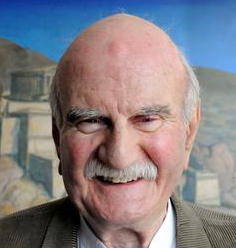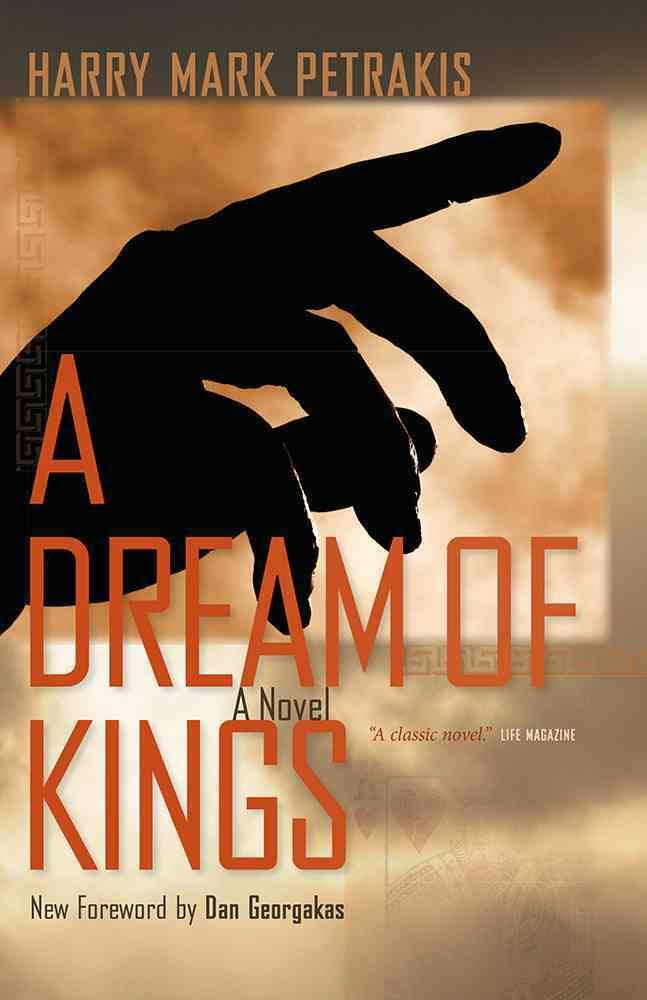"It’s a very tenuous profession, a profession where you love what you do and can only see yourself doing it—so damn the consequences."
Chicago’s Greek Town treated Harry Mark Petrakis like a celebrity. He often tromped Halsted Street between Jackson and Randolph Streets, stopping at this and that kafenio to drink coffee with the old men congregated there. Always, he’d end up at the old Diana’s grocery, where movie posters and stills from the 1969 Hollywood adaptation of Petrakis’s novel, The Dream of Kings, peppered the walls. The Kogiones brothers would foist meals on Petrakis—wouldn’t take no for an answer, even when he’d already dined elsewhere in the neighborhood.
“He was their chronicler, he was the one who understood the world they operated in,” said Harry’s middle son, John. “He thrived on that group, that neighborhood, those people. What [William] Saroyan was to the Armenians, my dad was to the Greeks. Chicago was a very rich place for him to draw on.”
Even before the big-time Hollywood film crew descended upon Greek Town to get its establishing shots on Halsted Street, including at Diana’s, Petrakis’s work permeated the consciousness of that community and well beyond. Starting with his first story publication in 1956, Petrakis explored the inner lives of people crowded into small apartments above storefronts, the backs of restaurants, side street taverns, and churches. He found humanity in warehouse, bakery, dock and rail yard workers. He understood the importance of family and ethnic identity to the American Dream. By the time of his death in 2021, Petrakis had left 11 novels, six short story collections, five memoirs, and three other non-fictional books built around his passion for community.
“He knew he wanted to be a writer from when he was a kid,” said John Petrakis. “There was never anything else he wanted to do. He had dozens of other jobs, he wrote about those other jobs, but writing was just essential to him. It validated who he was.”
Born in St. Louis, Petrakis moved to Chicago when he was just a toddler. His father, Mark, a priest, emigrated from Crete to Price, Utah to minister to miners, then was transferred to St. Louis. He moved his family to Chicago when he was called upon to lead Saints Constantine & Helen Greek Orthodox Church, then at 61st Street and Michigan Avenue. Soon after, the church built a new home at 73rd and Stony Island.
Petrakis attended Koraes Elementary School, which was part of Saints Constantine & Helen. There, he starred in class productions of Greek tragedies and built the foundation for his own creations. He realized he was a storyteller. As a grade school kid, he met Diana Perparos, whose father John owned several Hyde Park dry cleaning and shoe repair stores. He courted Diana until, in their teen years, they became a couple. Petrakis graduated from A.O. Sexton Elementary School (6020 S. Langley Ave), where he’d spent his final two grade school years.
High school was a short story. Though Petrakis read voraciously, a habit he’d formed during a bed-ridden year battling tuberculosis, he quickly abandoned his formal education. He started at Englewood High School, but lasted just a year and a half. He skipped school more and more until he stopped going altogether. Petrakis’s father then sent him to Urbana to live with brother Mike, a student at the University of Illinois, and continue his education. Petrakis only pretended to go to the Urbana high school, opting instead to hide out at one of Illinois’s many campus libraries. He lasted just two weeks at St. Procopius, a Catholic institution in Lisle. Petrakis wrote in Song of My Life: A Memoir, “Lest any aspiring writer use my meager academic resume to justify their own indolence and downgrade the value of education, let me warn them that the course of my life has been a bewildering series of incongruous events. There is no lesson to be learned besides the one that an outcome often depends on the vagaries of chance.”
Petrakis did not stray far from his childhood neighborhood in the first half of his life. He and Diana lived in a series of South Side apartments, and from 1950-56 stayed with Harry’s parents at 7601 S. Ridgeland. After a hiatus in Pittsburgh to work as a speech writer for U.S. Steel, Petrakis and family moved into a soon-to-be demolished house at 2766 E. 75th Street, right by Rainbow Beach. It was a dilapidated structure—literally condemned—that retained traces of its former elegant self, including stained glass windows and brass doorknobs. When the wrecking ball came for that house, the Petrakis family sidled just a bit west in the South Shore neighborhood, to 2463 E. 74th Place. This house, in which the Petrakis family lived from around 1960-67, was tiny; with three young boys plus Harry’s mom Stella, quarters were tight. Still, Harry carved out a writing studio for himself in the attic. This house, just east of Jeffery, was where Harry started to gain traction as an important author.
His debut novel, Lion at My Heart (1959) came out just before the Petrakises took up residence on 74th Place, but the novels The Odyssey of Kostas Volakis (1963) and A Dream of Kings (1966), as well as the short story collection Pericles on 31st Street (1965) were largely produced there.
“He was very much the writer all the time, very much the artist all the time,” said John. “He was a very warm and loving father, but the work was terribly important to him. He was always putting himself in the best position to keep working.”
Petrakis’s deep affection for Chicago’s Greek population naturally stemmed from his own ancestry. That connection proved inspirational to Petrakis’s personal life and critical to his fiction and non-fiction work. Always meticulous and precise in detailing his characters and settings, Petrakis increased his understanding of his Greek roots through a dozen trips to his homeland, not only Crete but throughout the country. In A Dream of Kings, Matsoukas embodies the entwinement of Chicago and Greece. While Matsoukas hungrily participates and loves his Halsted Street life, he becomes obsessed with the idea that only a return to his homeland will cure his terminally ill young son Stavros.
WBEZ investigative reporter Dan Mihalopoulos began reading Petrakis as a teen. “I guess the thing that impressed me the most was that someone had written, in English, about our unique little sub-culture,” he said. “It struck me that he really told a good story, and he infused his tales with a sense of the Greek-American love for not only food, faith and family but also politics and other human intrigue. He didn’t sanitize this world, either, by the way. His work resonated with me because I saw myself as both fully an American of Chicago and fully immersed in my ancestral culture.”
Though Petrakis never graduated high school, he later was awarded six honorary doctorates and taught at several universities, including as the McGuffey Visiting Lecturer at Ohio University and the Nikos Kazantzakis Chair in Modern Greek Studies at San Francisco State University. A gifted orator, Petrakis also earned a substantial living on the lecture circuit, often speaking without notes, or telling his powerful stories from memory.
His many awards included the “Atlantic First” Award (1957), a Benjamin Franklin Citation (1957), a Friends of American Writers Award (1964), a Friends of Literature Award (1964), a Society of Midland Authors Award (1964), an O. Henry Award (1966), a Carl Sandburg Award (1983), a Gabby Award for Arts & Culture (2009), and the Pancretan Association’s Nikos Kazantzakis Award for the Arts (2013). Petrakis was twice a finalist for the National Book Award in Fiction (1966 and 1967), and a Writer-in-Residence at both the Chicago Public Library (1976-77) and Chicago Board of Education (1978). He was given the Chicago Literary Hall of Fame’s Fuller Award for lifetime achievement in 2014.
“The remarkable genius of [Harry] Mark Petrakis is deeply rooted in the soil of two disparate worlds--the cultural iconography of Greece, its rich heritage and traditions, and the Greco-American immigrant experience of Chicago told in his delightful prose--a collection of rich anecdotes through the lens of personal nostalgia of a vanished time and place,” wrote prolific author and Chicago historian Richard Lindberg. “Mark was a brilliant and engaging storyteller who spiced his oft-told tales shared with readers and listeners through humor, irony, mirth and sentiment. I will always remember him as one of the icons of Chicago’s last literary renaissance.”
In 1968, after two years in Northridge, California, Petrakis moved his family to Chesterton, Indiana, about 50 miles southeast of the Chicago border, and he lived there his remaining days. As he had in Chicago, Petrakis maintained a custom-built writing studio—this one above his garage. Not only did it provide Petrakis quiet and solitude, it afforded him views of Chicago across Lake Michigan, including some sunsets in which the city’s entire skyline silhouetted against the sky. Chicago persisted as the base of his fictional world and he continued to make frequent trips there, for his research, for dinners or shows or the symphony with Diana, for literary engagements, or just to catch up with old and new Greek friends.
“Up until just a few months before he died, he was working on a new novel,” said John. “He so desperately wanted to keep living. His body was shutting down, he couldn’t eat anymore. Eventually he had to let go, but he didn’t want to go. He wanted to keep writing. He loved being a writer. He loved going to writer conferences. He loved working with young writers. He loved it all.”
read less









